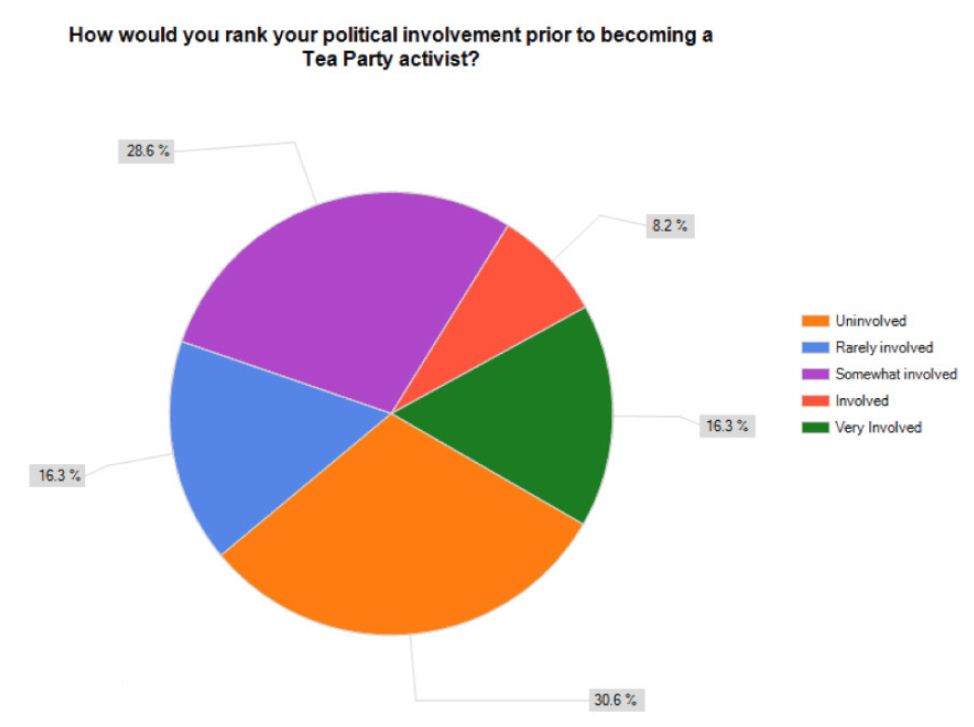I had the pleasure a couple of weeks ago of meeting with Anne Sorock and Yvonne Ralsky, co-founders of The Fontier Lab.
The Frontier Lab, among other things, utilizes “deep values research” common in consumer products marketing analysis (Anne is a Cornell Business School graduate who concentrated in the field) and applies those principles to politics. Unlike typical polling, which asks random people to answer a series of questions, they conduct in depth interviews much like a food company would with consumers before marketing a product.
Much of their work has been devoted to the Tea Party movement, and they have produced studies for the Sam Adams Alliance as to what motivates Tea Party members. In their first study of the Tea Party movment, The Early Adopters, they found, among other things, that a near majority of Tea Party supporters had little or no prior political involvement, and perhaps out of political naïvité, had very high hopes of making a positive impact:
The people involved with these movements are not political junkies or crusty right–wing extremists; 46.9% were uninvolved or rarely involved with politics prior to 2009….
70.3% are hopeful that they are having a positive impact on their country.
This pie chart illustrates how few Tea Party supporters were active prior to 2009:
During our conversation, I related the story, which I have related here before, about the event in October 2008 which caused me to change from passive if frustrated non-political observer, to become active in politics via this blog.
Anne and Yvonne mentioned that my experience was typical of the people who became active only in recent years and self-identify as supporting the Tea Party movement. In their interviews, a substantial number of people could relate the exact moment or event which triggered political interest. Here’s the finding from The Early Adopters study linked above:
But what was the click, the “Boiling Point” moment at which they transitioned from uninvolved American to fully engaged activist? Remarkably, this was such a strong experience for many of them that they were able to recount the exact moment this transition occurred.
The Frontier Labs follow up study, Surface Tension (October 2010), explored the likelihood of tension between Tea Party and establishment Republicans in the presidential primaries.
I thought of my conversation with Anne and Yvonne when I read Ben Domenech’s column, The Conversation With a Florida Tea Partier That Should Scare Every Republican. The column is worth a full read, but also read the comment by Domenech which gave rise to the column, which more concisely states the problem:
The Tea Party is a collection of people who felt compelled to transition from citizens to activists in favor of limited government and fiscal restraint. Many sacrifice time away from family, work, and life in a desperate attempt to save the nation they love, from their perspective.
This passion burns hot. But it also is just passion. Where cycles of political strife often include longtime activists bemoaning flawed nominees (as we saw in 2008 with McCain, and 1996 with Dole) and threatening to walk away, these are paid professionals who have been actively engaged in politics for decades. The Tea Party is much different, and has a much shorter timeframe of engagement, which may indicate they are more likely to return to their previously disenfranchised state. This could have major ramifications downticket.
Here’s how Rebecca, the person interviewed in Domenech’s column, related her feelings:
“I feel like the people who live politics just don’t understand those of us who don’t. I am a self-identified political junkie. I am enthralled this cycle with how things change so quickly, and I am trying to stay very informed. But I have to be honest, my time is limited. My family, my boys are my everything. Being informed takes time away from them,” she says, whether it’s engaging online, organizing activist responses, pushing back their naps to attend a rally.
“If I don’t feel like I’m making a difference, where is my incentive to take that time from them?” Rebecca asks.
The studies by The Fontier Lab, Domenech’s anectodal conversation with a Tea Party mom, and my own reading of Tea Party leaves, all support my sense that the way in which the Romney campaign has been run — uninspiring but brutally negative and efficient yet dependent upon massive supporting fire from establishment Republican media and politicians — will do great damage.
(added) If 2010 was the year in which so much seemed possible for the newly politically active within the Republican Party, 2012 is the year in which nothing seems possible within the Party.
We may be seeing the early signs of that damage in the moribund and sometimes lower turnout numbers in states and counties where Romney does well. We are at risk of heading back to the lifeless, limp political body of 2008.
Those who tuned in in 2009 are tuning out, getting ready to go back to their previous lives, rebuilding walls around themselves.
In 2010, it was appropriate to ask “Do you remember when you decided to become politically active?”
In 2013, the question may be “Do you remember when you decided to become politically inactive?”
 DONATE
DONATE
Donations tax deductible
to the full extent allowed by law.








